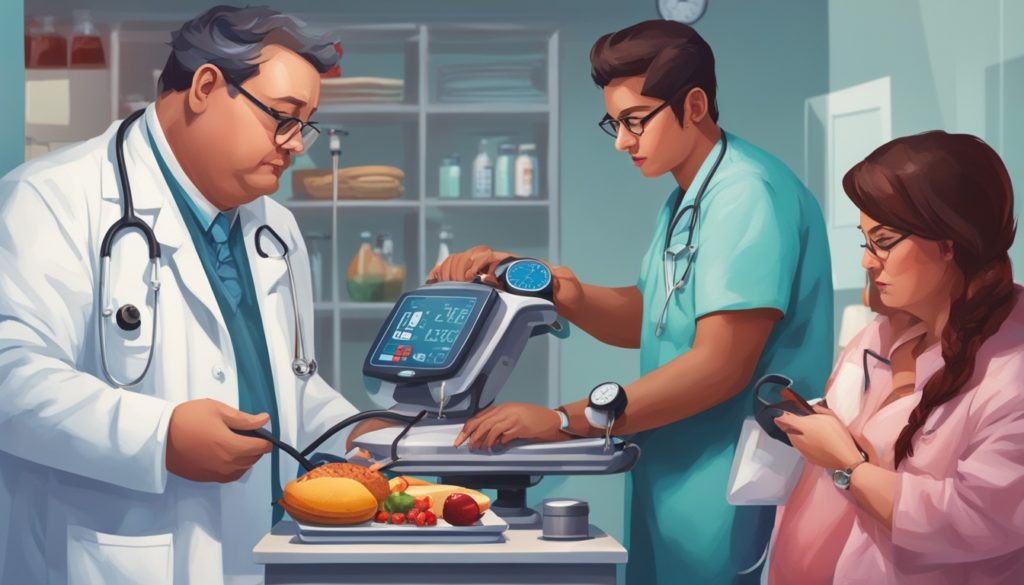Obesity-related high blood pressure is a growing health issue that needs our focus. Its impact has become more noticeable in the U.S., leading health experts to examine how extra weight links to higher blood pressure. It’s vital to understand and manage these risks to improve our health.
The link between obesity and high blood pressure affects health in many ways. This makes it important to find effective methods for dealing with both. We’ll look into why this happens, who is most at risk, and how to prevent or manage this type of hypertension.
Key Takeaways
- Obesity blood pressure is a significant health concern in the United States.
- The prevalence of weight-related hypertension has risen, necessitating deeper understanding and intervention.
- Excess body weight is directly correlated with increased blood pressure.
- Addressing obesity health risks can effectively contribute to managing high blood pressure.
- Future sections will explore mechanisms, demographics, and strategies for tackling this issue.
The Correlation Between Obesity and High Blood Pressure
Obesity and high blood pressure are closely linked. It’s important to understand how obesity causes high blood pressure for better health. This knowledge is vital for effective health care.

Understanding the Mechanisms
Excess weight puts more strain on blood circulation, leading to high blood pressure. Hormones like insulin and leptin, when unbalanced, can harm our arteries. This worsens blood pressure problems.
Knowing how obesity affects blood pressure helps in creating treatments. It points us in the right direction for health solutions.
Statistical Evidence
Studies, including those by the CDC, show a strong link between obesity and high blood pressure. About 70% of obese adults also have high blood pressure. This fact underlines the need to manage weight for blood pressure control.
Reports from reliable health groups support this. They show how closely these health issues are connected.
At-Risk Demographics
Age, genetics, and socio-economic status affect obesity and hypertension risk. The likelihood of these conditions grows as people get older. Genetic and economic factors also influence the risk.
Living in poorer areas can increase obesity and hypertension risk. This is due to poorer access to healthy foods and medical services. Targeted help for these groups is critical.
By tackling obesity, we can also fight high blood pressure. This approach promises better public health. Effective obesity treatments can make a big difference.
The Health Risks of Obesity-Related Hypertension
Obesity-related hypertension is more than just high numbers. It leads to serious health problems. These include not only high blood pressure but also other critical conditions.

Cardiovascular Diseases
Obesity raises the risk of heart issues. High blood pressure from obesity can cause atherosclerosis, heart attacks, and heart failure. This makes the heart work harder, leading to various heart diseases.
Kidney Problems
Obesity-induced hypertension also harms the kidneys. High blood pressure damages the kidneys’ blood vessels. This makes them less able to clean the blood.
Over time, this can cause chronic kidney disease. People may need dialysis or a kidney transplant.
Stroke Risks
Strokes are a major risk with obesity-related hypertension. High blood pressure can weaken and narrow brain blood vessels. This increases the chance of clots or vessel ruptures in the brain.
Thus, those with obesity-related hypertension are at a higher stroke risk. This can lead to severe disabilities or even death.
Managing Obesity to Regulate Blood Pressure
Effectively managing obesity helps control blood pressure. A key part of tackling weight issues involves a well-rounded plan. This plan should include eating better, staying active, and sometimes getting medical help. Using these methods together can make a big difference in dealing with obesity. This also helps keep blood pressure in check.
Starting with a healthy diet is crucial. It means eating less processed food, sugars, and bad fats. At the same time, eat more vegetables, fruits, lean meats, and whole grains. Making these food changes can lower blood pressure. It also stops obesity from causing more health problems.
Regular exercise is very important too. Doing things like cardio and lifting weights increases metabolism. It helps you lose weight and manage blood pressure. It’s important to stick with your workout plan to keep seeing results.
Some people might need medical help for obesity. This could be weight loss drugs or surgery to make the stomach smaller. It’s important to talk to doctors about these options. They can tell you about the good points and risks.
Behavioral therapy is also helpful in managing obesity. It offers support to help people change their lifestyle for good. Working on emotional and mental blocks can make it easier to keep up healthy habits. This support can play a big part in controlling blood pressure.
| Management Strategy | Main Benefits |
|---|---|
| Balanced Diet | Improved nutrition, weight loss, blood pressure regulation |
| Regular Exercise | Enhanced metabolic rate, weight loss, cardiovascular health |
| Medical Treatments | Effective for severe cases, targeted weight loss approaches |
| Behavioral Therapy | Long-term habit formation, psychological support |
In conclusion, there are many ways to effectively manage obesity and control blood pressure. By combining a healthy diet, exercise, medical interventions, and therapy, we can fight obesity. This comprehensive approach is key to overcoming health issues linked to obesity.
How Excess Weight Increases Blood Pressure
Understanding how extra weight leads to high blood pressure is key. Extra fat, or adipose tissue, makes your body hold more blood. This extra blood makes your blood vessels work harder, causing high blood pressure.
Fat adds more than weight; it messes with your hormones. Hormones like leptin and insulin help control your blood pressure. But, when you have too much fat, these hormones don’t work right. This problem makes high blood pressure worse.
Being overweight makes your body have too much blood. This extra blood makes it harder for your blood to move through your body. All these issues together make high blood pressure more likely. As shown in Table 1, there’s a clear link between being overweight and having high blood pressure:
| Factors | Impact on Blood Pressure |
|---|---|
| Increased Adipose Tissue | Higher Risk of Hypertension |
| Elevated Blood Volume | Increased Strain on Blood Vessels |
| Hormonal Imbalance | Disruption of Blood Pressure Regulation |
Obesity increases the risk of high blood pressure through more fat, more blood, and hormone issues. For more info, check out Health Care Navigator.
Preventive Measures to Combat Hypertension
To prevent high blood pressure, especially in those dealing with obesity, it’s important to take action early. Eating right, exercising regularly, and consulting a doctor can help.
Dietary Modifications
A healthy diet is key to avoiding high blood pressure. It’s important to eat less salt and more fruits and vegetables. Also, drink plenty of water. Choosing whole grains, lean meats, and low-fat dairy can help you lose weight and keep your blood pressure normal.
Exercise and Physical Activity
Staying active is crucial to prevent hypertension. Activities like cardio, lifting weights, and stretching can help you stay fit and improve heart health. You should aim for 150 minutes of moderate exercise a week. This helps with weight loss and controlling blood pressure. To learn more about overcoming weight loss challenges, check this detailed guide.
Medication and Medical Consultation
Some people might need medicine to manage their blood pressure. Regular check-ups with a doctor make sure the treatment is working. Doctors will find the best medicine for each person, adding to the plan for preventing high blood pressure.
Using these strategies together can reduce the risk of high blood pressure. It leads to a healthier, more active life.
Lifestyle Changes to Manage Obesity and Blood Pressure
It takes more than diet and exercise to tackle obesity and high blood pressure. Including lifestyle interventions can really improve your health. Lowering stress plays a key role in this, as it can directly impact your weight and blood pressure.
Practices like deep breathing, meditation, and yoga are great for reducing stress. These activities reduce cortisol levels, which, if too high, can lead to gaining weight and hypertension.
Don’t forget how important sleep is in managing weight. Not sleeping enough can mess with your metabolism, upping your risk for obesity and high blood pressure. Getting seven to eight hours of good sleep each night is crucial for your health.
Another important aspect is kicking bad habits, like smoking and heavy drinking. These habits can worsen obesity and hypertension. Cutting out smoking and limiting alcohol can greatly lower the risks associated with these conditions.
In short, fighting obesity and high blood pressure needs a varied approach. This includes reducing stress, sleeping well, and living healthier. Tackling these areas means you’re taking care of your health in a well-rounded way.
The Role of Nutrition in Managing Blood Pressure
It’s key to know how nutrition affects blood pressure control. A mix of a balanced diet, smart food choices, and certain supplements is important. These can help manage blood pressure well.
Importance of a Balanced Diet
Eating right is vital for good blood pressure. Nutritional advice helps get important nutrients for the heart. A diet rich in fruits, veggies, whole grains, and lean proteins is crucial.
Foods to Avoid
Avoiding certain foods is necessary for controlling high blood pressure. It’s important to watch how much salt you eat, as too much can increase blood pressure. Also, limit fats from fried and processed foods. They can harm your arteries and raise pressure.
- Sodium: Processed snacks, canned soups, lunch meats
- Trans Fats: Fried foods, baked goods, margarines
- Sugary Beverages: Sodas, sweetened teas, energy drinks
Supplements and Vitamins
Dietary changes are the base for managing blood pressure. Yet, some supplements and vitamins can help too. Omega-3s, magnesium, and potassium are good for blood pressure. Always talk to a doctor before starting supplements.
| Supplement | Benefits | Sources |
|---|---|---|
| Omega-3 Fatty Acids | Reduces inflammation and lowers blood pressure | Fish oil, flaxseed oil, chia seeds |
| Magnesium | Helps relax blood vessels, reducing blood pressure | Leafy greens, nuts, seeds |
| Potassium | Balances sodium levels and supports heart function | Bananas, oranges, sweet potatoes |
Exercise Recommendations for Lowering Blood Pressure
Adding the right exercises to your daily routine can lower blood pressure and boost health. It’s important to know which exercises work best.
Cardio Workouts
Cardio, or aerobic exercise, is great for reducing blood pressure. Brisk walking, running, swimming, and cycling make your heart work harder. This strengthens it. Health experts advise doing moderate cardio for 150 minutes weekly.
Strength Training
Resistance training like lifting weights and bodyweight workouts help control blood pressure too. Working these into your schedule two to three times a week increases muscle strength and heart health.
The Benefits of Consistency
Being consistent with exercise brings the best health gains. Mix aerobic activities with resistance training for better blood pressure and health. Small, steady changes lead to big health rewards over time.
Medical Interventions for Severe Cases
When lifestyle changes and diet aren’t enough, doctors might suggest medical treatments. This part talks about the treatments for high blood pressure and options for surgery in cases linked to being overweight.
Prescription Medications
Antihypertensive drugs are key in controlling high blood pressure. They help by making blood vessels relax or by slowing down the heartbeat. This reduces the stress on the walls of the arteries.
But it’s important to know about the side effects. These can include feeling dizzy, headaches, and being unusually tired. The effects can vary widely among patients. For more details on how these drugs work, check out the research at this link.
Surgical Options
If medication isn’t enough, surgery, like bariatric surgery, might be considered. This kind of surgery is a bigger step but can greatly help in lowering body weight and the problems that come with it, such as high blood pressure.
This not only helps in losing weight. It also improves heart health, making life better overall.
Looking at severe cases, we compare two choices: medication and surgery:
| Interventions | Mechanism of Action | Benefits | Limitations |
|---|---|---|---|
| Antihypertensive Drugs | Relax arteries, reduce heart rate | Effective blood pressure control | Side effects, dependency |
| Bariatric Surgery | Reduces stomach size | Significant weight loss, improved cardiovascular health | Invasive, postoperative risks |
The Psychological Impact of Obesity and Hypertension
Understanding the mental effects of obesity and hypertension is crucial. People with these issues face many emotional challenges. This can affect their overall happiness.
Also, managing chronic conditions like hypertension brings stress. Keeping up with medications and stress control is hard. It impacts their emotional health deeply.
Getting help for mental health is vital. Treatments like cognitive-behavioral therapy (CBT) teach coping strategies. Support groups also offer a space to share and learn from others.
“Addressing both the mental and physical aspects of health in individuals suffering from obesity and hypertension can lead to more successful overall treatment outcomes.”
A combined approach that includes psychological help can lessen the weight of these conditions. It improves mental and emotional health.
| Psychological Factors | Effects | Coping Mechanisms |
|---|---|---|
| Stigma | Anxiety, Depression | Support Groups, Therapy |
| Chronic Stress | Emotional Exhaustion | Stress Management Techniques, Mindfulness |
| Medication Management | Cognitive Load, Stress | Educational Programs, Counseling |
Case Studies on Successful Management of Obesity-Related Hypertension
Learning from others who have managed obesity-related hypertension can be insightful and motivating. These true stories show how some people have effectively managed their high blood pressure. They share the obstacles they encountered and the lessons they learned on their journey.
Real-Life Success Stories
A middle-aged woman significantly lowered her blood pressure by losing 50 pounds. She started with small, manageable lifestyle changes. This included eating a balanced diet and exercising regularly. Her steady and determined approach to weight loss worked well, helping her control her hypertension.
Another example is a retired man who battled obesity for many years. He was inspired by other patients’ stories to adopt a healthier lifestyle. By changing his diet and exercising daily, he shed extra pounds. This also boosted his energy and brought his blood pressure down to healthy levels.
Lessons Learned
These stories teach us important lessons for tackling obesity-related hypertension:
- Consistency is Key: Losing weight and managing high blood pressure demand ongoing effort and dedication.
- Small Changes Matter: Simple adjustments, such as better eating and more activity, can greatly improve health over time.
- Support Systems Help: Joining supportive communities and hearing about others’ experiences can motivate and offer useful advice.
The following table outlines the main strategies and outcomes from these real-life examples:
| Individual | Initial Weight Loss Strategy | Outcome |
|---|---|---|
| Middle-aged Woman | Balanced Diet and Exercise | 50-pound weight loss, effective hypertension control |
| Retired Gentleman | Dietary Modifications and Physical Activity | Significant weight loss, lower blood pressure |
Conclusion
Looking closely at how obesity links to high blood pressure shows they’re not separate issues. They are deeply connected health problems. This connection highlights the urgent need to be aware of obesity. We should also work to lessen its effect on blood pressure.
Knowing the dangers of obesity-related high blood pressure is the first step towards better health. This includes risks like heart disease, kidney issues, and stroke. Healthy eating, staying active, medical help, and the desire to change can help us manage these problems.
To handle weight and blood pressure, both lifestyle changes and expert advice are crucial. Having a positive view and focusing on health can lead to a happier future. It shows how important it is to keep working on our wellness.
FAQ
What is obesity blood pressure?
Obesity blood pressure is when being overweight ups your blood pressure. It’s a big health issue. This happens because being obese is linked to getting high blood pressure.
How common are obesity and hypertension in the United States?
The CDC says about 42.4% of U.S. adults were obese from 2017 to 2018. Many of these people also have high blood pressure.
How does obesity contribute to high blood pressure?
Being obese can raise blood pressure in several ways. It can cause hormone problems and increase blood volume. Also, more body weight puts more demand on your heart and blood vessels.
What are the primary health risks associated with obesity-related hypertension?
The big risks include heart diseases, like heart attacks and failure. There’s also kidney damage and a higher stroke risk.
How can weight management help in regulating blood pressure?
Managing your weight through different ways can really help lower blood pressure. This can involve changing your lifestyle, getting medical help, and therapy.
What are the preventive measures to combat hypertension?
To fight high blood pressure, eat better, exercise regularly, and get medical advice for the right medication and treatments.
How important is nutrition in managing blood pressure?
Nutrition is key to controlling blood pressure. Eating well, cutting down on salt and bad fats, and maybe taking supplements can help fight hypertension.
What types of exercises are recommended for lowering blood pressure?
For lowering blood pressure, cardio and strength exercises are best. Staying consistent with your workouts is crucial for your health.
What medical interventions are available for severe cases of obesity-related hypertension?
In tough cases, there are drugs and surgeries like bariatric surgery available.
How do obesity and hypertension affect mental health?
They can lead to stress, emotional issues, and feeling stigmatized. Support for mental health and managing stress is really important for your well-being.
Can you provide examples of successful management of obesity-related hypertension?
Absolutely, there are success stories that show how to effectively handle obesity and high blood pressure. These stories provide helpful insights and lessons.


